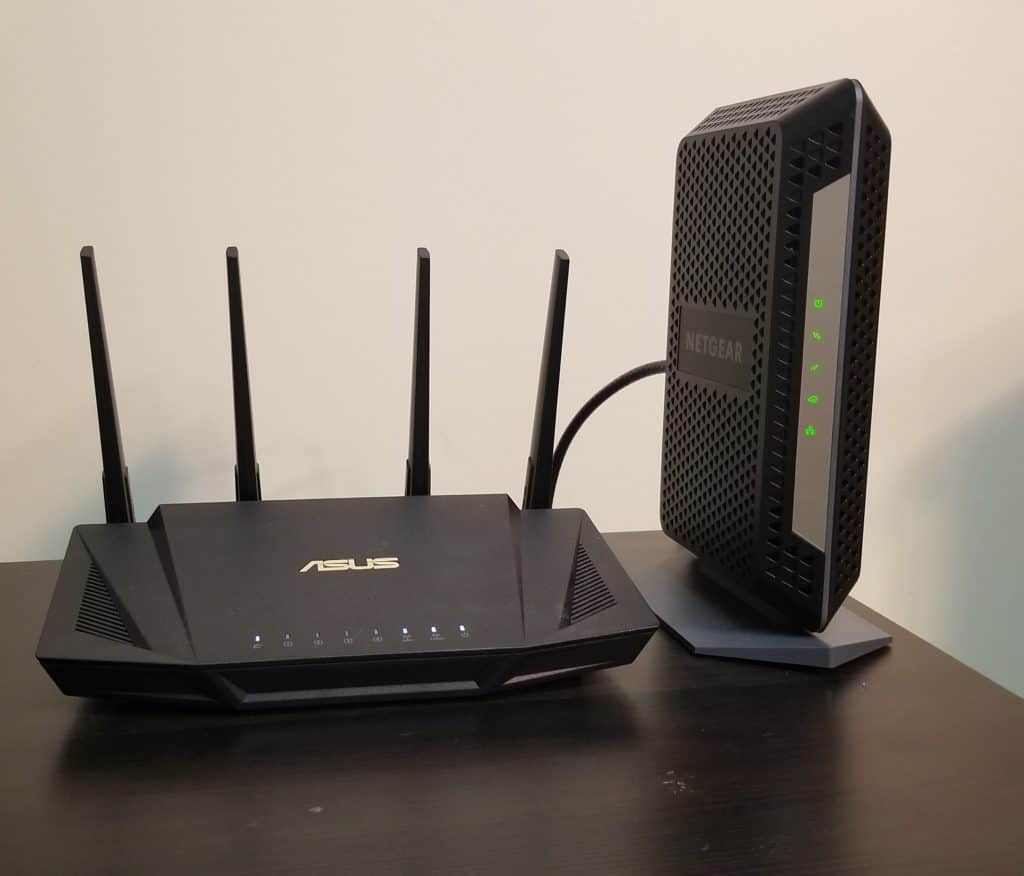Newcomers to the home networking world can quickly find themselves overwhelmed with all the technical jargon and hardware. I know I was once there. With a little help, you can learn the basics and get yourself up and running in no time. A common questions is: do modems have WiFi? Let’s dive in and find out.
Modems generally only connect to an Internet Service Provider and do not create Wi-Fi. Wireless routers generate a Wi-Fi signal. However, some manufacturers create dual-purpose devices that do the job of both the modem and router.
I’ll walk you through the difference between a modem and a router, and then we’ll look at several options that merge the two devices together.
Modem vs. router. What’s the difference?

As you probably know, the first thing you’ll need to get internet into your house is a service plan from an Internet Service Provider. ISPs are companies that sell internet connections to local customers, and they commonly also provide cable TV and phone services. Well known ISPs include Charter, Comcast, Mediacom, and AT&T.
The ISP sends internet to and from your house. However, you’ll need some hardware in your home or business to make everything work properly. That’s where modems and routers come into play. Here’s what they do:
| Hardware | Function |
| Modem | Modems send and receive data from the your Internet Service Provider, and they generally only send data to one device. |
| Router | Routers plug into the modem and create a WiFi network for all the devices in the home to share. Dozens of devices can connect to a router. |
What does a modem do?
If you look at the image above, you’ll see the modem and router that I use in my house. The modem is on the right, and its sole job is to bring internet into my house by communicating with my ISP. Mediacom is my local provider, and I’ve been one of their customers for years. While styles can vary by manufacturer, modems generally sit vertically and have a series of lights that signify various aspects of their connection status. It’s normal for the lights to flicker on a modem.
What does a router do?
The router sits on the left on the picture above this text, and its job is to create stable WiFi for my house. The easiest way to spot a router is to look for the antennas. Obviously, my router has four movable antennas, and the router uses them to connect to different devices in my house on different frequencies.
Essentially, a router allows many devices in a home or business to share an internet connection using WiFi. The software inside the router prioritizes the internet traffic inside the home and keeps everything running smoothly and efficiently.
You can manually adjust the priorities of internet traffic inside your home; those features are available in the Quality of Service (QoS) settings inside the router.
Do routers affect internet speed?
Routers significantly affect the speed of the internet connection on the network. If you’d like to read more about it, check out my article titled Do routers affect internet speed?

Do modems have WiFi?
Modems generally do not have WiFi. As we’ve discussed, modems and routers perform two different functions. Modems connect to the internet and routers create a WiFi signal for the whole house to share.
Like most technologies that work closely together, some companies offer devices that combine the modem and router into one unit. These gadgets are called modem router combos.
Motorola manufactures modem router combos, and one of their popular models is the MG7700, and it’s readily available on Amazon.
Should you buy or rent your modem and router?
Consumers have several options when it comes to purchasing a router, modem, or combo unit. The first decision is whether to buy any equipment at all. Internet Service Providers generally offer the option to simply rent equipment from them for a monthly fee. Let’s take a look at the buy/rent decision.
| Choice | Pro | Con |
| 1. Buy a modem and router | Better performance with better equipment. You can get exactly what you want, and you can upgrade at your convenience. | Upfront expense. |
| 2. Rent from ISP | Simple and easy. The ISP remains responsible for the equipment. | The monthly rental fees cost more than purchasing in the long run. You also must use what ISP provides. |
I personally purchase my own modem and router because it’s cheaper over time than perpetually renting from my ISP. If you decide to make a purchase, ensure you understand how ISPs measure internet speed so you buy the right equipment. I wrote a few articles on the topic, and you should definitely read them before dropping any cash. Check out the articles Gigabit vs gigabyte and Megabit vs megabyte. You won’t regret it!
Further, keep in mind that not all modems are compatible with all ISPs. Don’t get too worried though – modems are mostly universal. Just be sure you double-check with you ISP before buying anything.
Should you buy separate modems and routers?
Assuming you make the decision to purchase your modem and router, you’ll also have to decide if you want a combo unit or separate devices. Let’s take a look at the pros and cons of combo and individual units.
| Choice | Pro | Con |
| 1. Purchase separate modem and router | Upgrading a single component is easier, and you’ll also enjoy a broader range of options to suit your needs and budget. Most people use separate modems and routers. | Higher upfront cost. |
| 2. Purchase a modem/router combo | Cheaper upfront cost and fewer electrical plugs dedicated to the internet connection. | You’ll have fewer choices when making a purchase. |
Final thoughts
Modems and routers serve different functions in a home network, and I hope that I provided some helpful information for you. While most people choose to use separate modems and routers, others elect for a combo unit. Ultimately, the choice is up to you, and I wish you well with your home network. Take care!
